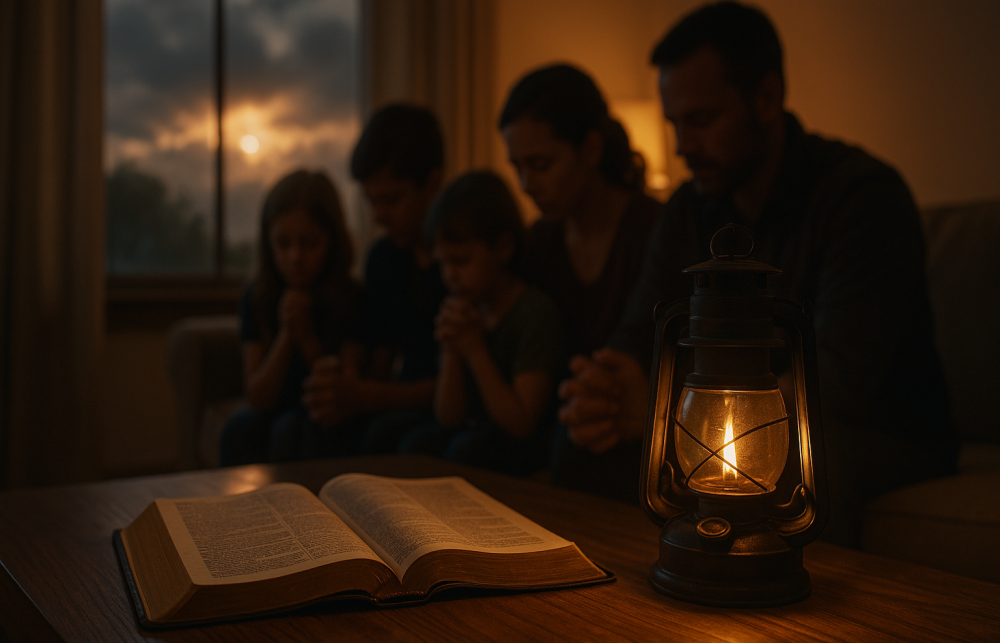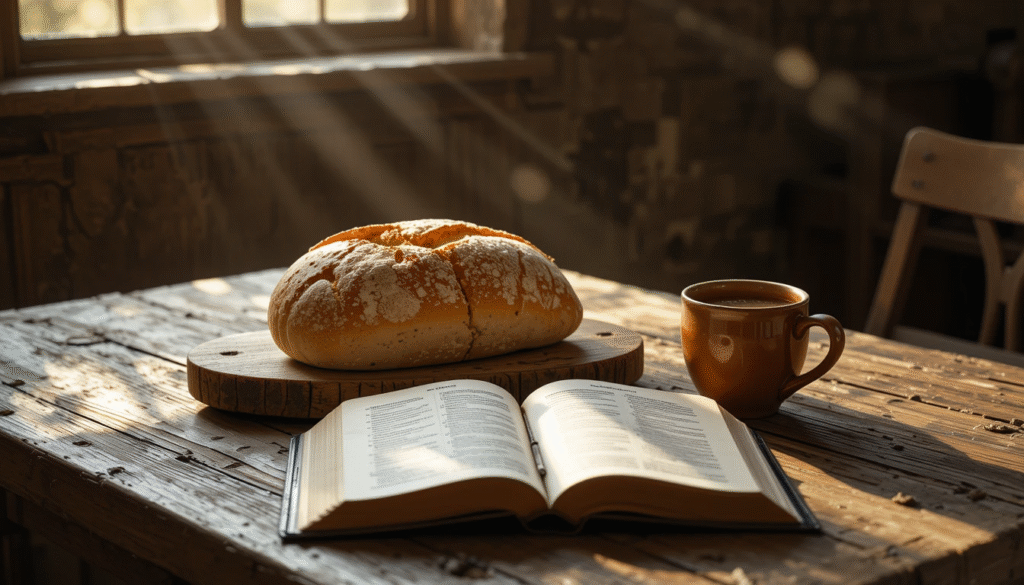Ten Bible verses to calm fear, strengthen faith, and guide your family through uncertain times—plus a simple family prayer format you can use this week. In seasons of crisis, whether from global events, financial stress, or personal struggles, it’s easy for households to feel overwhelmed and uncertain about the future. Yet the Word of God reminds us that we are never without hope. Scripture anchors our families in truth, lifts our eyes from fear, and points us back to the One who holds tomorrow in His hands. These verses are more than inspirational quotes—they are promises from God to sustain, strengthen, and encourage you when life feels unstable. By weaving them into daily routines, families can find peace together and build spiritual resilience that outlasts the storm.
When headlines feel heavy and life gets tight, God’s Word steadies us. The news may change by the hour, but Scripture doesn’t shift with circumstances. It reminds us who God is, what He has promised, and why we can rest secure no matter what the world looks like. Use these verses in your home—read them aloud, pray them together, and post them where you’ll see them often. They are meant to be anchors, keeping your family’s hearts calm in the middle of the storm.

1) God’s Peace in the Storm — Philippians 4:6–7
“Do not be anxious about anything, but in every situation, by prayer and petition, with thanksgiving, present your requests to God. And the peace of God, which transcends all understanding, will guard your hearts and your minds in Christ Jesus.”
Paul wrote these words from prison, not from a place of comfort. That makes the promise even more powerful—God’s peace isn’t tied to circumstances; it’s tied to His presence. Fear thrives in uncertainty, but peace thrives in surrender. When we trade our worries for prayers, we open the door for God’s supernatural calm to steady us in ways we can’t explain.
Reflection:
Ask yourself, “Am I spending more time rehearsing my worries or releasing them to God?” Anxiety drains energy and clouds judgment, but thanksgiving and prayer invite His Spirit to guard both heart and mind.
Family Use:
- Have each person list their top three worries on a sheet of paper.
- Pray through them one by one, thanking God specifically for past moments when He has already provided.
- End by reading the verse aloud together as a declaration of trust.
Faith + Practice Connection:
Preparedness starts in the heart. Stockpiles and plans matter, but they can’t replace God’s peace. A calm, steady household—rooted in prayer—is better equipped to respond wisely when life feels out of control.
2) God as Refuge — Psalm 46:1
“God is our refuge and strength, an ever-present help in trouble.”
Context:
This psalm was written during a time of national crisis for Israel. Enemies surrounded them, kingdoms rose and fell, but the psalmist declared that God alone was their safe place. Notice the word “ever-present.” His help isn’t delayed, out of reach, or dependent on circumstances. He is right there in the middle of the chaos.
Reflection:
We all look for refuge somewhere. For some, it’s money in the bank. For others, it’s political systems, personal skills, or even stockpiles of supplies. While those things have their place, none of them can guarantee peace when life shakes. Psalm 46 redirects our focus: God Himself is our shelter, the One who covers and strengthens us when everything else feels unstable.
Ask yourself: Where do I instinctively run first when trouble comes? Do I try to control everything on my own, or do I lean into God as my refuge?
Family Use:
- Gather your family and read Psalm 46 aloud together.
- Take a piece of paper and draw a large shield. Inside the shield, have each family member write one area where they need God’s protection right now (fear, finances, health, etc.).
- Pray over the shield together, asking God to be your refuge in each area.
Faith + Practice Connection:
Preparedness is wise, but even the strongest shelters or most secure plans are temporary. Psalm 46 reminds us that true resilience flows from trusting God as our refuge. A home that seeks Him first will not be easily shaken, no matter what the headlines say.
3) Fear Not — Isaiah 41:10
“Fear not, for I am with you; be not dismayed, for I am your God. I will strengthen you, yes, I will help you, I will uphold you with My righteous right hand.”
Context:
Spoken originally to Israel during exile, these words reminded God’s people that even in their most vulnerable moment, He had not abandoned them. They felt small, outnumbered, and weak — but God’s power, not their own, would carry them through. That promise remains true for us today.
Reflection:
Fear often creeps in when we face things we cannot control — illness, job loss, natural disasters, or uncertain futures. Yet Isaiah 41:10 tells us plainly: God’s presence is greater than our fear. His “righteous right hand” symbolizes authority, strength, and victory. When He upholds us, nothing can tear us down.
Ask yourself: Am I letting fear write my story, or am I leaning into God’s promise to strengthen and uphold me?
Family Use:
- Go around the room and let each person finish this sentence:
“God, today I need Your strength for ______.” - Write them on a sheet of paper, then pray over each request together, asking the Lord to show His strength in those areas this week.
Faith + Practice Connection:
Preparedness often exposes our limits. We can store supplies, plan wisely, and build resilience, but we cannot guarantee outcomes. Isaiah 41:10 reminds us that ultimate security is found in God’s presence, not in stockpiles. The strongest survival tool your family can carry is faith that He will strengthen, help, and uphold you in every trial.

4) Daily Bread — Matthew 6:31–34
“So do not worry, saying, ‘What shall we eat?’ or ‘What shall we drink?’ or ‘What shall we wear?’ For the pagans run after all these things, and your heavenly Father knows that you need them. But seek first His kingdom and His righteousness, and all these things will be given to you as well. Therefore do not worry about tomorrow, for tomorrow will worry about itself. Each day has enough trouble of its own.”
Context:
These words come from Jesus’ Sermon on the Mount, where He addressed daily concerns that weighed on His listeners’ hearts. In a culture where survival often depended on the day’s wages or harvest, food and clothing were constant worries. Jesus wasn’t dismissing their needs — He was redirecting their focus. God already knew what they needed, and His kingdom priorities had to come first.
Reflection:
Preparedness often walks a fine line. On one side is wisdom — setting aside food, water, and supplies for our families. On the other side is anxiety — obsessing over what could go wrong tomorrow. Jesus calls us to release the anxiety without abandoning wisdom. When we seek God first, He promises to provide what we need.
Ask yourself: Am I spending more time worrying about tomorrow than I am seeking God today? Anxiety multiplies when we project fears into the future, but peace comes when we trust Him with our daily bread.
Family Use:
- Begin with prayer as a family before making any weekly plans or grocery lists.
- Together, make a simple “this week” plan after prayer, writing down meals, schedules, or to-dos.
- As you plan, thank God out loud for each resource He’s already provided.
Faith + Practice Connection:
Preparedness isn’t meant to replace faith; it’s meant to flow from it. Storing food or planning wisely is good stewardship, but obsessing over “tomorrow” drains today’s peace. Jesus reminds us that every stocked pantry and every purchased item ultimately comes from the Father’s hand. By seeking Him first, our planning shifts from panic-driven to peace-driven.
5) Shepherd Care — Psalm 23:1–3
“The Lord is my shepherd; I shall not want.
He makes me lie down in green pastures;
He leads me beside the still waters.
He restores my soul;
He leads me in the paths of righteousness for His name’s sake.”
Context:
Psalm 23 is one of the most beloved passages in Scripture, written by David — a shepherd himself who knew firsthand what it meant to guide, protect, and provide for sheep. David painted a picture of God’s intimate care: leading us, refreshing us, and keeping us safe, even in uncertainty. These verses are not just poetry; they are a declaration of God’s faithfulness in every season.
Reflection:
When life feels chaotic, these words remind us that God’s care is not distant or abstract. Just as a shepherd stays close to his flock, so the Lord stays near to His people. He doesn’t just meet needs; He restores souls. He doesn’t just provide food and water; He brings peace and rest. In crisis, we often strive and stress — but God calls us to rest in His leading.
Ask yourself: Am I letting the Shepherd lead, or am I trying to navigate every path on my own?
Family Use:
- Read the whole psalm aloud slowly as a family, pausing after each line.
- Take deep breaths together as you read, letting the words bring calm.
- End by sharing one way each person has seen God “restore their soul” recently.
Faith + Practice Connection:
Preparedness can easily become a restless pursuit — always trying to do more, store more, plan more. But Psalm 23 reminds us that true peace isn’t found in endless striving. It’s found in resting under the care of the Good Shepherd. A prepared home is good; a shepherd-led home is unshakable.
6) Wisdom for Decisions — James 1:5
“If any of you lacks wisdom, let him ask of God, who gives to all liberally and without reproach, and it will be given to him.”
Context:
James wrote to believers facing trials and scattering due to persecution. They were under pressure, making difficult decisions daily. In that environment, he reminded them that God freely gives wisdom when we ask in faith. Unlike human advice, which often comes with conditions or judgment, God’s wisdom flows generously to His children.
Reflection:
When crisis strikes, decision-making becomes harder. Do we save or spend? Do we prepare more or pause? Do we act now or wait? The temptation is to react out of fear, but James tells us that God’s wisdom is available — wisdom that cuts through confusion and fear with clarity and peace.
Ask yourself: When I face hard choices, do I turn first to God for wisdom, or do I exhaust myself chasing every other voice?
Family Use:
- Together, identify one decision your family is currently facing (budget, schooling, preparedness step, or relational conflict).
- Pray James 1:5 aloud as a family, asking specifically for God’s wisdom in that decision.
- Write down the impressions, Scriptures, or practical steps that come to mind — and review them later to see how God answered.
Faith + Practice Connection:
Preparedness is full of choices: what to buy, when to act, how to plan. Without wisdom, it’s easy to overspend, panic, or miss what really matters. But when we slow down and ask, God often shows us simple, practical steps that align with His will. His wisdom keeps our households steady — spiritually and practically.
Deeper Reading:
If you want to go further on this, check out our article Spiritual Readiness for the End Times. It’s a reminder that wisdom in the last days isn’t just about survival decisions — it’s about discernment, prayer, and keeping our eyes on Christ.
👉 Spiritual Readiness for the End Times

7) Courage in Trials — John 16:33
“In the world you will have tribulation; but be of good cheer, I have overcome the world.”
Context:
Jesus spoke these words to His disciples just before His arrest and crucifixion. He was preparing them for sorrow, persecution, and trials that would shake their faith. Yet His final word was not despair but victory: “I have overcome the world.” Their peace would not come from avoiding trouble but from knowing that He had already secured triumph.
Reflection:
Every family will face trials — sickness, financial hardship, strained relationships, even persecution for faith. Jesus never promised a trouble-free life; in fact, He promised the opposite. But He also gave us the reason not to lose heart: He has already won. His victory is our courage. Knowing the end of the story (that Christ reigns) gives us strength to walk through the middle chapters (our present struggles).
Ask yourself: When trials come, do I measure my hope by circumstances or by Christ’s victory?
Family Use:
- Invite each person to share one recent “overcomer” story — a time when God helped them through something difficult.
- Write these down in a family journal titled “God’s Faithfulness.”
- Revisit it when new trials arise, reminding one another that the God who was faithful before will be faithful again.
Faith + Practice Connection:
Preparedness can give us tools to endure trials, but it cannot guarantee peace. Jesus offers what no stockpile ever could: courage rooted in His eternal victory. Even when the world shakes, a Christ-centered household can stand strong, knowing that trials are temporary but His triumph is forever.
Deeper Reading:
For encouragement on how early believers stood firm under pressure, see our upcoming article: Lessons from the Early Church for End-Times Living. Their story shows us that faith and courage go hand in hand when Christ is our focus.
8) God’s Provision — Philippians 4:19
“And my God shall supply all your need according to His riches in glory by Christ Jesus.”
Context:
Paul wrote these words to the Philippian church after they had generously supported his ministry, even out of their own limited resources. He reassured them that their giving would not leave them lacking — God Himself would supply their every need. The promise wasn’t rooted in abundance of possessions, but in the unlimited riches of Christ.
Reflection:
When times get tough, it’s natural to worry about how bills will be paid, how food will be supplied, or how families will be sustained. But Philippians 4:19 reminds us that provision flows from God’s glory, not from our own ability to control circumstances. His supply is not limited by recessions, shortages, or disruptions. He sees what we need and delights to provide for His children.
Ask yourself: Do I measure provision by what I see in my pantry or by the promises of God?
Family Use:
- Have each family member thank God for three ways He has provided in the last month — big or small.
- Write them on sticky notes and place them on the refrigerator or a family bulletin board as a reminder of His faithfulness.
- End by praying as a family for someone you know who is struggling with needs, asking God to supply them as well.
Faith + Practice Connection:
Preparedness is part of stewardship, but it must never replace reliance on the Lord. Stocking food, water, and supplies is wise — but peace comes from trusting the Source, not just the supply. By preparing faithfully and holding resources with open hands, we reflect Christ’s generosity to others in need.
Practical Resource:
For families looking to wisely steward what they have and invest in tools that make sense, we’ve reviewed gear and resources we personally trust. You can explore these here:
👉 Trusted Products & Reviews
Deeper Reading:
See our article 12 Essential Survival Items Every Christian Home Should Have for practical ways to prepare physically while staying grounded in faith. It shows how provision and stewardship walk hand in hand.
9) Perfect Love Casts Out Fear — 1 John 4:18
“There is no fear in love; but perfect love casts out fear, because fear involves torment. But he who fears has not been made perfect in love.”
Context:
John was writing to believers surrounded by false teachings and uncertainty. Fear had gripped many, but he reminded them that God’s love is not fragile or partial — it is perfect, complete, and fear-destroying. Where God’s love is received, fear cannot stay.
Reflection:
Fear drains life from a household. It unsettles children, divides marriages, and distracts from faith. But love — God’s love flowing through us — changes the atmosphere. When families choose to speak love instead of fear, to act in compassion instead of panic, fear loses its power. God’s love is not just an idea; it’s an active presence that drives away the torment fear tries to bring.
Ask yourself: Is my home more filled with words of fear or words of love?
Family Use:
- Parents, gather your children and speak a short blessing of God’s love over each child by name. Example: “[Child’s name], God’s love for you is strong, unshakable, and perfect. You are safe in Him.”
- Encourage children (and spouses) to speak one word of love or encouragement over another family member.
- End by praying together, asking God to fill your home with His love so completely that fear has no room.
Faith + Practice Connection:
Preparedness often deals with fear-driven scenarios, but Scripture calls us to respond in love, not torment. Stockpiles, plans, and strategies may help in crises — but only love removes fear at its root. A home prepared with supplies but not filled with love will still feel unstable. A home grounded in love, however, will stand strong even in trials.
Deeper Reading:
If fear often drives your decisions, revisit our article Encouraging Scriptures for Families in Crisis (this post itself will serve as a cornerstone piece). You might also pair this with Spiritual Readiness for the End Times to see how love and discernment protect households spiritually as well as practically.

10) Strength When You’re Weary — Isaiah 40:29–31
“He gives power to the weak, and to those who have no might He increases strength. Even the youths shall faint and be weary, and the young men shall utterly fall, but those who wait on the Lord shall renew their strength; they shall mount up with wings like eagles, they shall run and not be weary, they shall walk and not faint.”
Context:
Isaiah delivered this promise to God’s people in exile, a people exhausted by hardship and worn down by waiting. His reminder? God never grows weary, never runs out of strength, and is eager to renew those who turn to Him. Human strength fails, but His strength is unlimited.
Reflection:
Weariness doesn’t just come from long days of work — it comes from worry, stress, constant bad news, and carrying loads God never asked us to carry. The promise of Isaiah 40 is not that we will avoid weariness, but that God Himself will exchange our weakness for His strength when we choose to wait on Him. Waiting isn’t passive; it’s active trust — pausing, praying, and drawing near to the One who renews.
Ask yourself: Am I trying to push through in my own strength, or am I waiting on the Lord to renew me?
Family Use:
- Play quiet worship music and sit together in stillness for five minutes. No devices, no noise — just “waiting on the Lord.”
- Encourage each family member to share one area of life where they feel weary. Then, as a family, ask God to renew strength in those exact areas.
- Close with the image Isaiah gives — soaring like eagles, running without weariness, walking without fainting.
Faith + Practice Connection:
Families need more than stockpiles and plans — they need renewal. Just as batteries drain and need recharging, our spirits wear down and need God’s power to keep going. Preparedness includes spiritual practices that refresh our hearts so we don’t crumble under the weight of trials. Waiting on the Lord is one of the most powerful “preps” we can build into our homes.
Deeper Reading:
Pair this with Hope in Troubled Times: Fixing Eyes on Christ’s Return (coming soon). When we grow weary, the reminder of His return renews perspective and strengthens endurance.
Simple Family Prayer
“Lord Jesus, thank You that You are our refuge and strength. Calm our fears, guide our steps, and provide what we need today. Fill our home with Your peace and help us love one another well. We trust You. In Your Name, Amen.”
Helpful Next Steps
- Practical readiness without panic: See our Trusted Products & Reviews for gear we actually use and recommend.
- Budget build-up guide: Coming this week — How to Start a 30-Day Food & Water Supply for Under $200.
- Go deeper in faith: Read Spiritual Readiness for the End Times for a bigger picture of how faith and wisdom walk hand-in-hand.
The Greatest Preparation: Salvation in Christ
All the verses, prayers, and supplies in the world won’t matter if we miss the most important preparation — knowing Jesus Christ as Lord and Savior. Scripture says:
“If you declare with your mouth, ‘Jesus is Lord,’ and believe in your heart that God raised Him from the dead, you will be saved.” — Romans 10:9
If you’ve never surrendered your life to Christ, you can do so today. Here’s a simple prayer you can make your own:
Prayer of Salvation
“Lord Jesus, I confess that I am a sinner in need of Your grace. I believe You died for my sins and rose again to give me eternal life. Today, I turn from fear and place my trust in You as my Savior and Lord. Please forgive me, fill me with Your Spirit, and guide me from this day forward. In Jesus’ name, Amen.”
If you prayed this, you’ve taken the most important step of all — securing eternal life and peace in Christ.
If this encouraged you, please share it with a friend who needs peace today.
👉 Follow and connect with us on Facebook: Prepared and Redeemed for weekly encouragement, new resources, and updates.
And don’t forget to subscribe for our weekly faith + preparedness pairing so your home can stay steady — spiritually and practically.
